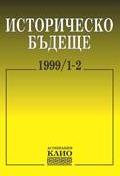Русия: дългият път към Европа
Russia: the Long Way to Europe
Author(s): Petya B. DimitrovaSubject(s): History
Published by: Асоциация Клио
Keywords: modern Russian history; East-West relations; Russia's modernization; natonal identity
Summary/Abstract: The article is dedicated to one of the hottest topics in modern Russian history: Russia's identity in the context of the East-West relations. The author examines two different approaches to Russia's development during the last three hundred years of its history: a/ Russia as a European nation which, due to a variety of reasons, lags behind the developed European nations but which has the chances of catching up with them; and b/ Russia as a synthesis of European and Asian traditions which has led to the formation of the Russian superethnos with its own specific civilization. The adherents of the latter theory emphasize the incompatibility of Russian civilization with its Western counterpart. Both theories, however, show that Russians tend to identify themselves in terms of "East" and "West" which, to a large degree, exemplify the relationship between tradition (non-Western, agrarian) and modernity (Western, industrial) as well as the transition from the former to the latter in the process of Russia's modernization. Basically, for the last three hundred years Russia's attempts at modernization have been predetermined by the imperial pattern set up by Peter the Great. The process of Russia's modernization went through several cycles which were mostly provoked by foreign political factors and which, in one way or another, brought to the fore the contradictions inherent of Russian society. For this reason, the problem of defining Russia's identity - and Russia's priorities in the international scene - has always been linked to the problems of Russia's relations with Europe. The article is centered around two problems of basic importance: a/ the Russian imperial government pattern and the role it played in defining Russia's priorities in the international scene as well as in Russia's relations with the West; and b/ the Western attitudes towards Russia which was seen as being different from the West and as having its own priorities in world politics. Such an approach to the Russia-Europe relationship allows one to focus on the historic roots of the contradictions which have always marred Russia's relations with the West. At the same time, it could help future politicians on both sides overcome the traditional mistrust between Russia and the West and develop a new kind of relationship.
Journal: Историческо бъдеще
- Issue Year: 1999
- Issue No: 1-2
- Page Range: 76-109
- Page Count: 34
- Language: Bulgarian
- Content File-PDF

